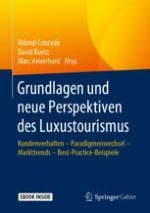2019 | OriginalPaper | Buchkapitel
5. Marketingmanagement von Luxusanbietern
verfasst von : Marc Aeberhard, Magda Antonioli Corigliano, Sara Bricchi, Juliet Kinsman, Keiko Kirihara
Erschienen in: Grundlagen und neue Perspektiven des Luxustourismus
Verlag: Springer Fachmedien Wiesbaden
Aktivieren Sie unsere intelligente Suche, um passende Fachinhalte oder Patente zu finden.
Wählen Sie Textabschnitte aus um mit Künstlicher Intelligenz passenden Patente zu finden. powered by
Markieren Sie Textabschnitte, um KI-gestützt weitere passende Inhalte zu finden. powered by
